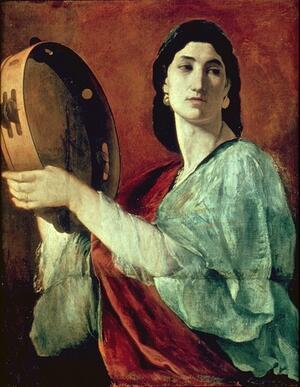And the Women, Dancing With Their Timbrels...
This month our Rising Voices Fellows are examining how their Jewish and feminist identities intersect. Be sure to check the JWA blog each Tuesday for a new post from our fellows—and check out the great educational resources provided by our partner organization, Prozdor.
The new Reform version of Mi Chamocha specifically mentions the prophet Miriam alongside her brother Moses. It’s one of several changes in recent years to help make the traditional prayers more balanced in gender. This one stands out, however, because Miriam has without a doubt become the star of the Mi Chamocha. At my temple, we often segue from that prayer right into “And the women, dancing with their timbrels...” We joyously praise God and women at the same time, and it is all thanks to Miriam.
Over the past few decades, Miriam has become the most prominent symbol of feminism in Judaism, and I am proud to say that I share her name.
“Miriam Rivkah” is my Hebrew name. My parents were only just beginning to explore their Judaism when I was born, and my Hebrew name was initially just a suggestion that my parents took from the rabbi. It didn’t mean very much at the time besides sounding nice. Over time, however, it started to mean a lot. I shared this part of my identity with a very recognizable prophet, and to make it even better, it didn’t double as my Anglicized given name. It was like having a secret identity; whenever we heard the story of baby Moses, I felt for sure that I was the one putting the basket in the Nile and watching over it as it floated away. And no one else knew about it but me—as a result, the list of my most personal, intimate spiritual moments includes watching The Prince of Egypt.
Having this connection to Miriam really made me better appreciate the way that feminism has become a part of the Jewish world. For as long as I can remember, my family has filled a cup with water and placed it on our seder table. It’s Miriam’s Cup, a nonalcoholic counterpart to Elijah’s Cup, and for a long time, the cup we used was one I had decorated myself in Sunday school. We now use an ordinary water glass, but I still think of it as mine. Not every family has a cup for Miriam on the table, which makes it even more special—in fact, it’s rare enough that we often have to explain its purpose to our Pesach guests. I listen with personal pride as my parents explain; just like any other item on the seder table, it represents something important. In this case, it’s the strength of Jewish women, and, appropriately, it’s named for the strongest female figure in the Passover story.
I love being Jewish and I stay with it because of the values it espouses (tikkun olam, kehilah kedosha) and because it’s my culture, my family, and my history. But there is something that I must admit: I am a biblical skeptic. The stories I learned at Sunday school seemed fishy to me from the moment I realized that dinosaurs were animals just like the rest of the things created along with humans on Day 6. In my heart, I’ve never seen any Torah story as anything more than that: a really great story.
I might feel as if I wasn’t completely Jewish if it weren’t for the one biblical figure whom I believe, with every ounce of my being, did exactly what the Torah said she did: Miriam the Prophet, who kept a close and worried eye on her newborn brother until she knew he’d found a safe home.
Miriam the Prophet, who led a joyous celebration of freedom through a song and through a dance.
Miriam the Prophet, a woman who stood at the front of the fleeing Israelite crowd, a leader along with her brothers. She has always been a part of me, and as she has become a symbol of feminism in the Jewish faith, I’ve felt deep pride.
This piece was written as part of JWA’s Rising Voices Fellowship.







You missed the whole point of Miriam and in your feminism you forgot God. The Torah is not just "a" story, it is the inspired Word of God ... Miriam is a prophet, a leader, but a minor one, her jeolousy of Moses punished her by God, then she came back to her place in the tribe not as Moses or Aaron but as their sister. She is to be admired, but do not make the mistake of making her more than she was, she was never a priest nor on the level if her brothers. God's words are not to be interpreted at your whim for you will mistakenly lead others to perdition. Do not let your pride of 'feminism' cloud your mind of Who God Is...
Another voice added to the chorus of reinterpreting Judaism to include the wisdom, strengths and gifts of women. Well done!!!
WOW! What great insight. I appreciate your sharing
Marissa, I've always felt exactly the same way about Miriam the Prophet! So proud to share a name not only with a courageous Biblical woman, but with you too. Keep up the great work, Marissa! :)